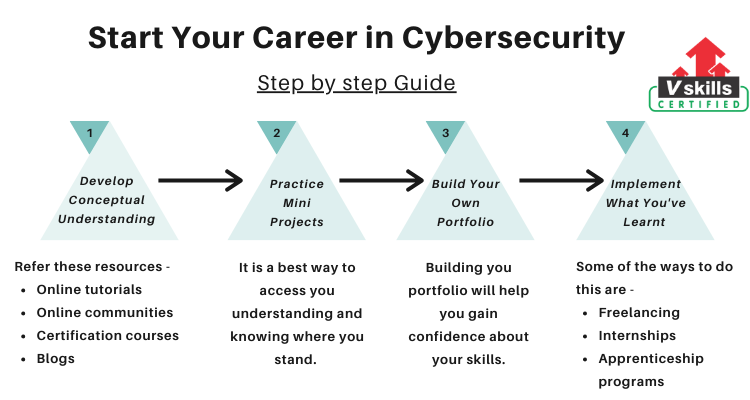Cybersecurity has become a pressing problem for almost all sectors as digital transformation sweeps the globe with next-generation technologies. Businesses are increasingly gaining a better understanding of the threat environment as the number of cyber-attacks rises, and they are looking for trained experts to join their team.
Let us discover Cybersecurity Career Paths!
What is cybersecurity?
The practise of shielding devices, networks, and programmes from digital attacks is known as cybersecurity. These cyberattacks are usually aimed at gaining access to, altering, or damaging confidential data, extorting money from users, or disrupting normal business processes.
Responsibilities of a typical Cybersecurity Analyst
- Cybersecurity analysts are responsible for checking updates for the latest security and technology developments.
- They plan for disaster recovery and further create contingency plans in the event of any security breaches.
- They also monitor for attacks, intrusions, and unusual, unauthorized, or illegal activity as well as test and evaluate security products.
- Cybersecurity analysts also design new security systems or upgrade existing ones. Moreover, they use advanced analytic tools for determining emerging threat patterns.
- Next, they identify potential weaknesses and implement measures that include firewalls and encryption.
- They also monitor identity and access management as well as monitor for abuse of permissions by authorized system users.
- Lastly, they maintain an information security risk register and assist with internal and external audits relating to information security. And also monitor and respond to ‘phishing’ emails and ‘pharming’ activity.
How can you start your career in Cybersecurity?
To be acceptable at something, it is critical to have a good start with appropriate assets and learning content. As a result, in order to be a pro in this area, your first steps toward learning must be appropriate. Let’s take a look at some steps you can take to start your learning process –
Step 1 – Learn about the basics and Develop Conceptual understanding
You must first establish a stable foundation before you can become an expert in those fields. And you’ll need to have the right applied skills before you can move on to the practical portion. Everything has to begin somewhere. You must begin small if you want to have a successful career in this field. You may use the following tools to get a complete understanding of the domain:
- Firstly, Online Tutorials for Cybersecurity
- Also, Certification Courses from verified sources such as Vskills, Coursera, Udemy and so on.
- In addition, Online communities
- Moreover, Blogs and study material from experts in this field and many more.
Vskills also provide Online tutorials, certification courses and free practice tests for the same. You can check them out on our official site.
Step 2 – Practice Mini Projects
If you want to land in a good position, you must practise. It’s also a perfect way to see where you are in terms of putting your knowledge into effect. In practical aspects such as the application of Cybersecurity in ventures, experience will help you outlast other things. To better understand the practical aspects, you can supplement your learning by reading blogs and tutorials on various websites. You can also attend various conferences – domestic as well as international and various webinars in order to polish your skills.
Step 3 – Build Your Portfolio
Building a portfolio will help you gain trust in your abilities while also giving you a place to practise what you’ve learned. Your portfolio shows the ability to prepare and execute various codes, as well as the quality of your Cybersecurity skills. These tasks can provide a variety of datasets and provide readers with interesting tidbits of knowledge gleaned from your research. Your portfolio doesn’t have to be about a single subject; pick a few that interest you and see what you can do with them.
Step 4 – Implement your skills in Real world
It’s important to practise your skills, which is why you’ve spent so much time learning how to do it perfectly! It’s also important that you stay up to date and continue to improve your own skills. Some specialist courses may also be used to show advanced abilities. You are also welcome to attend. Here are some examples of how you can improve your abilities:
- Freelancing
- Internships
- Apprenticeship programs
The above steps will help you to get this domain started. It’s a long way to go, however. You can take an advanced course to reach a new level of skills.
Cybersecurity Career Paths
Some of the jobs that you can pursue as a Cyber Security professional include:
Security Specialist
Your primary responsibility as a security expert would be to safeguard a company’s software and network security system. Conducting internal and external security audits, as well as vulnerability monitoring, risk analyses, and security assessments, are all part of the job description.
Incident Responder
Incident responders are a valuable asset to a company, and they are typically professionals who have completed Cyber Security incident response training. Their job involves rapidly handling threats and taking the requisite precautions to deter future attacks.
Security Analyst
Cyber security analyst training teaches people how to analyse security policies and procedures to protect an organization’s digital security. Your day-to-day responsibilities will include identifying vulnerabilities in an organization’s infrastructure and devising new ways to secure it. Planning, implementing, and updating security measures and controls are also part of their responsibilities.
Forensic Expert
A career as a forensic specialist in Cyber Security entails investigating the causes of a breach to determine how it occurred and who committed the crime. This role necessitates diligent evidence handling, as well as educating first responders about how to treat electronic evidence such as laptops, hard drives, and portable drives.
Security Engineer
By finding possible security gaps, a security engineer defends computer and networking networks from potential hacking. A security engineer’s key role is to track and log analysis of multi-vendor security solutions. Security engineers who have completed many Cyber Security training courses are familiar with common security vulnerabilities and mitigation techniques.
Market Demand and Average Salaries
The surge in demand for skilled cyber security specialists, coupled with a lack of talent, has resulted in high pay and excellent benefits for eligible candidates. Here’s a look at some of the most in-demand cyber security jobs and their national median salaries:
Cyber Security professionals are in great demand. Companies specializing in IT or cybersecurity is constantly hiring skilled Cyber Security professionals. Various public and private companies also need Cyber Security professionals for their IT or cybersecurity departments. Professional candidates will find employment opportunities in various companies like EMC, Akamai, Citrix, Virtusa, HCL, Vmware.
Conclusion
Cyber security is only one of countless career opportunities within the broader field of computer science, as wide as it is. It takes time and effort to study what each choice has to offer before deciding on the best one for you.
Discover the career opportunities as a Cybersecurity. Hurry up and start preparing now!




